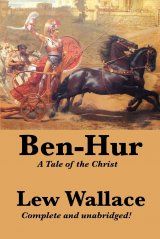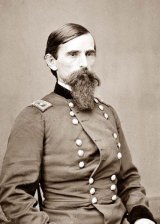Ben-Hur Page #7
Ben-Hur: A Tale of the Christ is a novel by Lew Wallace, published by Harper and Brothers on November 12, 1880, and considered "the most influential Christian book of the nineteenth century". It became a best-selling American novel, surpassing Harriet Beecher Stowe's Uncle Tom's Cabin in sales.
to leave the country. The demand was in the name of the Lord God of Israel. Pharaoh refused. Hear what followed. First, all the water, that in the lakes and rivers, like that in the wells and vessels, turned to blood. Yet the monarch refused. Then frogs came up and covered all the land. Still he was firm. Then Mosche threw ashes in the air, and a plague attacked the Egyptians. Next, all the cattle, except of the Hebrews, were struck dead. Locusts devoured the green things of the valley. At noon the day was turned into a darkness so thick that lamps would not burn. Finally, in the night all the first-born of the Egyptians died; not even Pharaoh's escaped. Then he yielded. But when the Hebrews were gone he followed them with his army. At the last moment the sea was divided, so that the fugitives passed it dry-shod. When the pursuers drove in after them, the waves rushed back and drowned horse, foot, charioteers, and king. You spoke of revelation, my Gaspar--" The blue eyes of the Greek sparkled. "I had the story from the Jew," he cried. "You confirm it, O Balthasar!" "Yes, but through me Egypt speaks, not Mosche. I interpret the marbles. The priests of that time wrote in their way what they witnessed, and the revelation has lived. So I come to the one unrecorded secret. In my country, brethren, we have, from the day of the unfortunate Pharaoh, always had two religions--one private, the other public; one of many gods, practised by the people; the other of one God, cherished only by the priesthood. Rejoice with me, O brothers! All the trampling by the many nations, all the harrowing by kings, all the inventions of enemies, all the changes of time, have been in vain. Like a seed under the mountains waiting its hour, the glorious Truth has lived; and this--this is its day!" The wasted frame of the Hindoo trembled with delight, and the Greek cried aloud, "It seems to me the very desert is singing." From a gurglet of water near-by the Egyptian took a draught, and proceeded: "I was born at Alexandria, a prince and a priest, and had the education usual to my class. But very early I became discontented. Part of the faith imposed was that after death upon the destruction of the body, the soul at once began its former progression from the lowest up to humanity, the highest and last existence; and that without reference to conduct in the mortal life. When I heard of the Persian's Realm of Light, his Paradise across the bridge Chinevat, where only the good go, the thought haunted me; insomuch that in the day, as in the night, I brooded over the comparative ideas Eternal Transmigration and Eternal Life in Heaven. If, as my teacher taught, God was just, why was there no distinction between the good and the bad? At length it became clear to me, a certainty, a corollary of the law to which I reduced pure religion, that death was only the point of separation at which the wicked are left or lost, and the faithful rise to a higher life; not the nirvana of Buddha, or the negative rest of Brahma, O Melchior; nor the better condition in hell, which is all of Heaven allowed by the Olympic faith, O Gaspar; but life--life active, joyous, everlasting--LIFE WITH GOD! The discovery led to another inquiry. Why should the Truth be longer kept a secret for the selfish solace of the priesthood? The reason for the suppression was gone. Philosophy had at least brought us toleration. In Egypt we had Rome instead of Rameses. One day, in the Brucheium, the most splendid and crowded quarter of Alexandria, I arose and preached. The East and West contributed to my audience. Students going to the Library, priests from the Serapeion, idlers from the Museum, patrons of the race-course, countrymen from the Rhacotis--a multitude--stopped to hear me. I preached God, the Soul, Right and Wrong, and Heaven, the reward of a virtuous life. You, O Melchior, were stoned; my auditors first wondered, then laughed. I tried again; they pelted me with epigrams, covered my God with ridicule, and darkened my Heaven with mockery. Not to linger needlessly, I fell before them." The Hindoo here drew a long sigh, as he said, "The enemy of man is man, my brother." Balthasar lapsed into silence. "I gave much thought to finding the cause of my failure, and at last succeeded," he said, upon beginning again. "Up the river, a day's journey from the city, there is a village of herdsmen and gardeners. I took a boat and went there. In the evening I called the people together, men and women, the poorest of the poor. I preached to them exactly as I had preached in the Brucheium. They did not laugh. Next evening I spoke again, and they believed and rejoiced, and carried the news abroad. At the third meeting a society was formed for prayer. I returned to the city then. Drifting down the river, under the stars, which never seemed so bright and so near, I evolved this lesson: To begin a reform, go not into the places of the great and rich; go rather to those whose cups of happiness are empty--to the poor and humble. And then I laid a plan and devoted my life. As a first step, I secured my vast property, so that the income would be certain, and always at call for the relief of the suffering. From that day, O brethren, I travelled up and down the Nile, in the villages, and to all the tribes, preaching One God, a righteous life, and reward in Heaven. I have done good--it does not become me to say how much. I also know that part of the world to be ripe for the reception of Him we go to find." A flush suffused the swarthy cheek of the speaker; but he overcame the feeling, and continued: "The years so given, O my brothers, were troubled by one thought--When I was gone, what would become of the cause I had started? Was it to end with me? I had dreamed many times of organization as a fitting crown for my work. To hide nothing from you, I had tried to effect it, and failed. Brethren, the world is now in the condition that, to restore the old Mizraimic faith, the reformer must have a more than human sanction; he must not merely come in God's name, he must have the proofs subject to his word; he must demonstrate all he says, even God. So preoccupied is the mind with myths and systems; so much do false deities crowd every place--earth, air, sky; so have they become of everything a part, that return to the first religion can only be along bloody paths, through fields of persecution; that is to say, the converts must be willing to die rather than recant. And who in this age can carry the faith of men to such a point but God himself? To redeem the race--I do not mean to destroy it--to REDEEM the race, he must make himself once more manifest; HE MUST COME IN PERSON." Intense emotion seized the three. "Are we not going to find him?" exclaimed the Greek. "You understand why I failed in the attempt to organize," said the Egyptian, when the spell was past. "I had not the sanction. To know that my work must be lost made me intolerably wretched. I believed
Translation
Translate and read this book in other languages:
Select another language:
- - Select -
- 简体中文 (Chinese - Simplified)
- 繁體中文 (Chinese - Traditional)
- Español (Spanish)
- Esperanto (Esperanto)
- 日本語 (Japanese)
- Português (Portuguese)
- Deutsch (German)
- العربية (Arabic)
- Français (French)
- Русский (Russian)
- ಕನ್ನಡ (Kannada)
- 한국어 (Korean)
- עברית (Hebrew)
- Gaeilge (Irish)
- Українська (Ukrainian)
- اردو (Urdu)
- Magyar (Hungarian)
- मानक हिन्दी (Hindi)
- Indonesia (Indonesian)
- Italiano (Italian)
- தமிழ் (Tamil)
- Türkçe (Turkish)
- తెలుగు (Telugu)
- ภาษาไทย (Thai)
- Tiếng Việt (Vietnamese)
- Čeština (Czech)
- Polski (Polish)
- Bahasa Indonesia (Indonesian)
- Românește (Romanian)
- Nederlands (Dutch)
- Ελληνικά (Greek)
- Latinum (Latin)
- Svenska (Swedish)
- Dansk (Danish)
- Suomi (Finnish)
- فارسی (Persian)
- ייִדיש (Yiddish)
- հայերեն (Armenian)
- Norsk (Norwegian)
- English (English)
Citation
Use the citation below to add this book to your bibliography:
Style:MLAChicagoAPA
"Ben-Hur Books." Literature.com. STANDS4 LLC, 2024. Web. 23 Dec. 2024. <https://www.literature.com/book/ben-hur_1675>.




Discuss this Ben-Hur book with the community:
Report Comment
We're doing our best to make sure our content is useful, accurate and safe.
If by any chance you spot an inappropriate comment while navigating through our website please use this form to let us know, and we'll take care of it shortly.
Attachment
You need to be logged in to favorite.
Log In